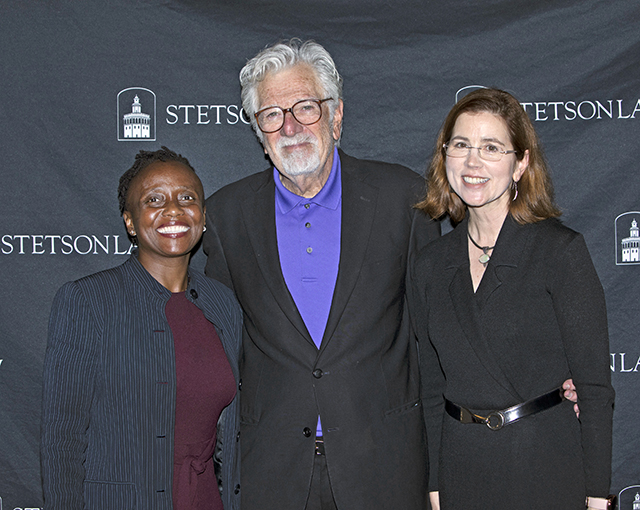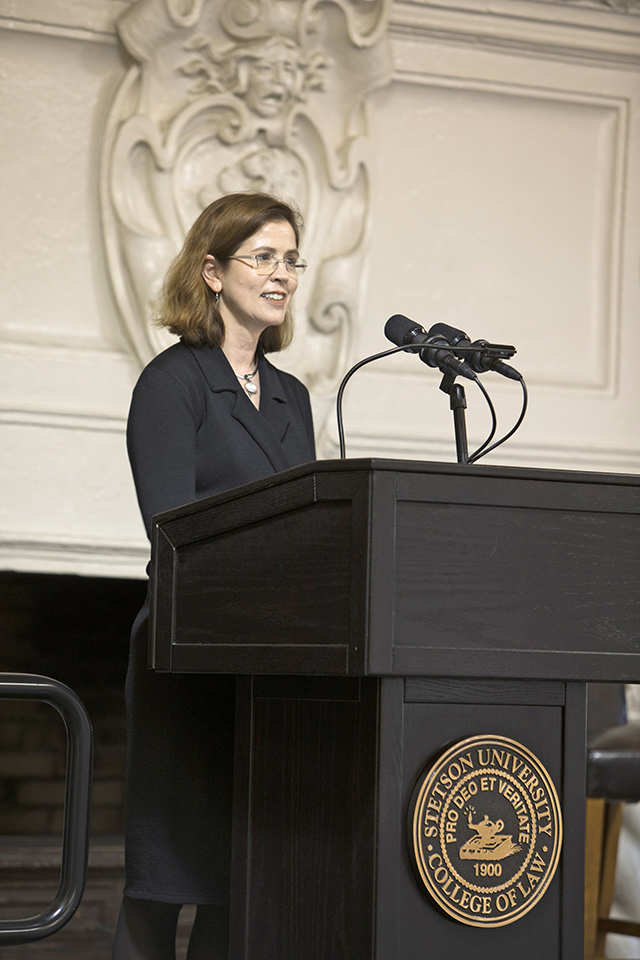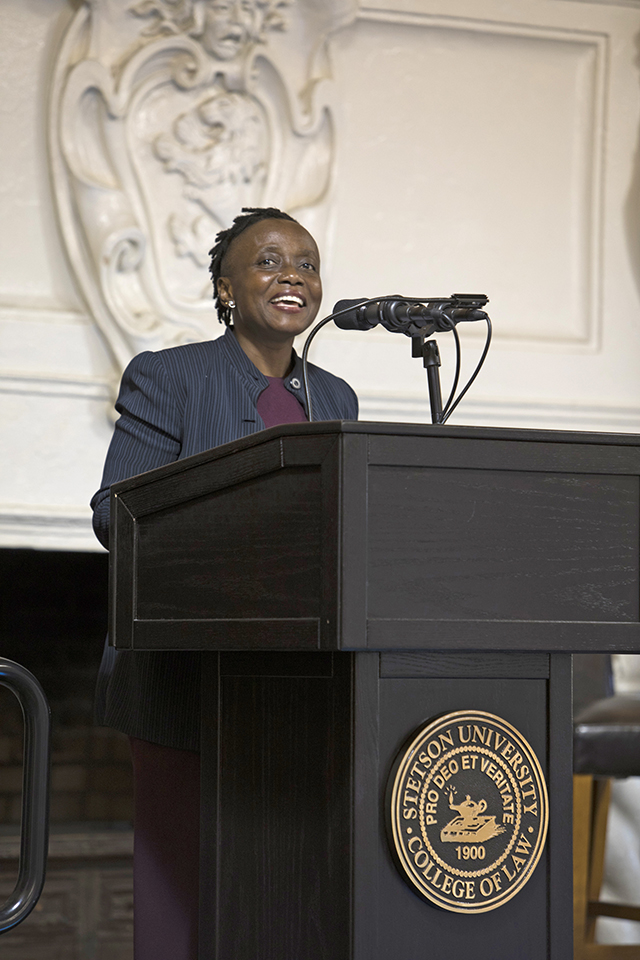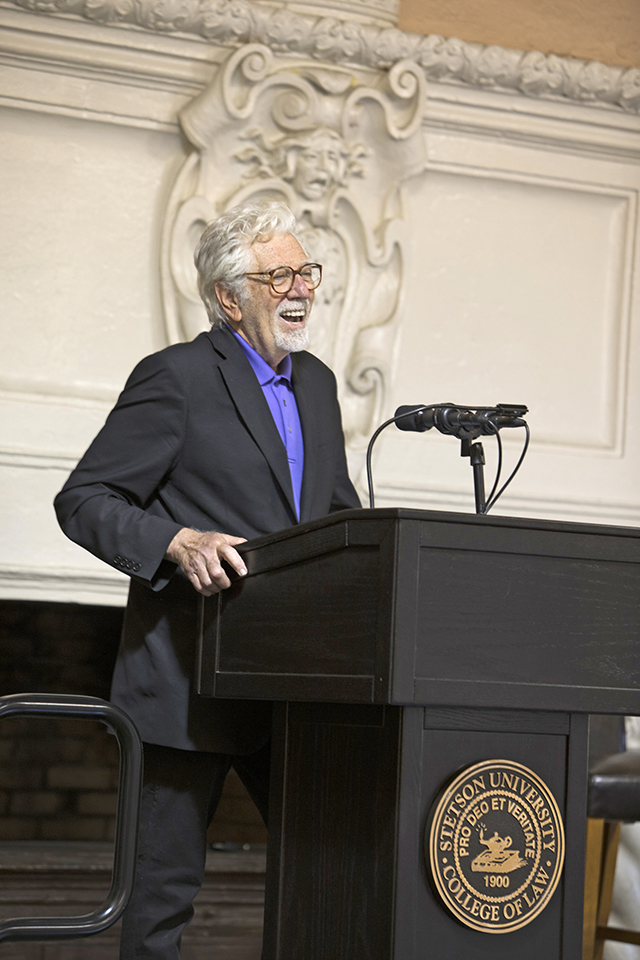Highlights from the Annual Inns of Court Event with Jules Coleman
The Annual Inns of Court event looked a little different in 2022 than most years, but the spirited hybrid event offered the Stetson Law community compelling conversation, fresh insights, and a few laughs along the way.
The yearly event invites students, faculty, and local Inns of Court chapter members to dine, network, and hear remarks from an esteemed speaker. The evening’s lecture component is named for William Reece Smith, Jr., who was a distinguished professor of law at Stetson.
Introducing the event’s namesake
Event organizer and Professor Kristen Adams, whose full title is William Reece Smith, Jr. Distinguished Professor of Law, opened the event, which was headlined by esteemed law and philosophy scholar, Dr. Jules Coleman, who was her professor at Yale Law School.
She opened the event with a video highlighting Smith’s career, and referred to him as “a legal icon, mentor, advisor, teacher, a champion of civil rights and a consummate professional, who upheld the highest of standards.”
“He was also passionate about educating young lawyers,” Adams added of the former Stetson Law adjunct professor, who was inducted into the college’s Hall of Fame in 2004.
Dean Michèle Alexandre then introduced Coleman, with an overview of his storied career, from his extensive work in academia to his current activities as a thought-leader in education.
No stranger to Stetson Law
Before diving into his keynote, Coleman said he’s been to campus before – and joked that he might have enjoyed his being in the room more than others present.
“It is not the first time I have been here…But every time I have spoken is a great pleasure to me,” Coleman said. “I can’t swear whether it is a pleasure for anybody else. I hope to make it interesting and enjoyable and that the hour goes reasonably quickly.”
During his 90-minute discussion, which included a question-and-answer session, Coleman spoke off the cuff and his remarks were full of humorous asides – and wisdom for the students and young lawyers in the room.
“I always enjoy being here, and, this time is no exception,” Coleman said. “I think you are all very fortunate to have a wonderful faculty guiding you. And I hope all of you, as you seek a career in law, appreciate that it is a noble profession and that its nobility depends, in part, of your capacity to always be responsive and ensure that it meets its promises to those who are under its authority.”
Comparing law & philosophy
An accomplished scholar in both philosophy and the law, Coleman spent much of his lecture, titled “What Can Be Learned From Thoroughbred Horses and Trolley Cars,” exploring the differences between philosophy and the law, and how theoretical underpinnings of the former can inform practice of the latter.
The two have one key thing in common, though, he said.
“I realized that one of the problems of both law and philosophy was that it was in a language that ordinary people typically have less access to and less comfort with, and that it involved concepts that were not easily accessible to them,” Coleman said. “But that didn’t mean that the problems that ordinary people faced and that ordinary communities faced were not problems that showed up time and time again, both in moral philosophy and moral theory and in legal practice.”
The first portion of his lecture – concerning the thoroughbreds – explored a complex scenario that occurred during the 2019 Kentucky Derby, when the winning horse was disqualified – to the benefit of the runner up – after injuring a horse that was well behind in the running. The case raised questions applicable in the courtroom.
“There is a general question about whether anybody in a case like this has standing or whether you have to be the wronged party to have standing,” Coleman said. “That is, of course, a central question in the law.”
Law & the “trolley problem”
The lecture also explored the trolley problem, its multiple variations, and their applications within the law, such as whether a party should be held liable for actions they take when their life is being threatened. The famous philosophical thought experiment explores ethics via a hypothetical – but utterly unrealistic – scenario, which Coleman joked was a sign that those who study philosophy might want to get out more.
“It just shows how outdated philosophers are, that they talk about trolleys rather than trains,” he said. “Maybe that was the last time anybody rode public transportation who is a philosopher.”
The point of exploring the law through lenses like these, he said, is to understand that legal practice is invariably tied to the real-life situations that are governed by laws, and that the law shouldn’t be studied in a vacuum.
“The law is not isolated…not like Kafka’s picture of it,” Coleman said. “In many ways it is, of course. It is incredibly bureaucratic and mysterious. That is done on purpose so you guys can make money, right? But it is not really. It is designed to help us find ways of living with one another.”
Learn more about Jules Coleman and his visit to Stetson Law.
Post date: Feb. 25, 2022
Media contact: Kate Bradshaw
[email protected] | 727-430-1580



